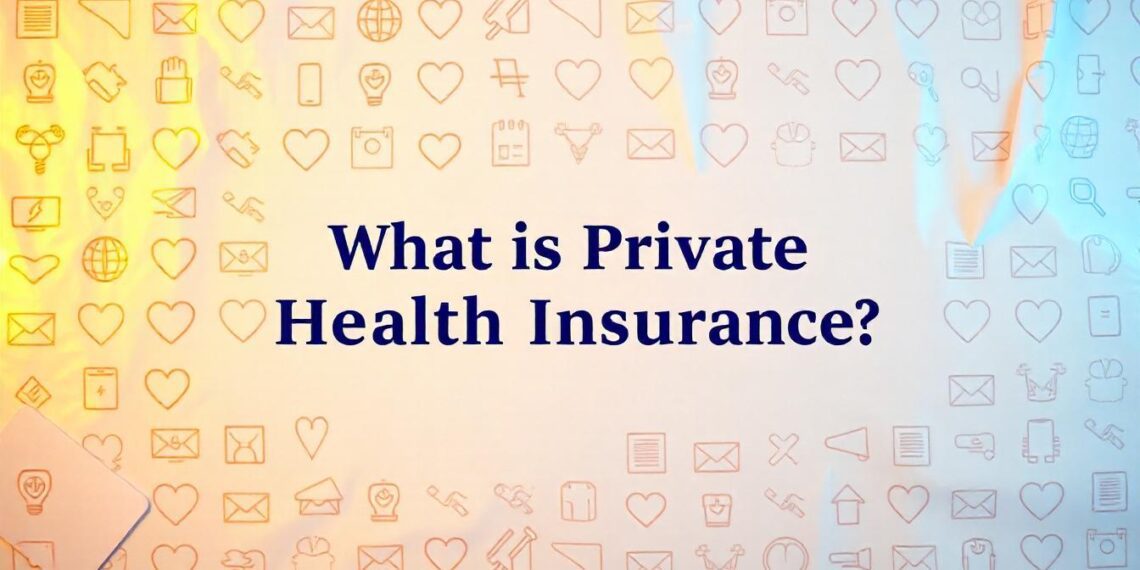Health insurance is one of the biggest decisions you will make and deciding between private or public insurance can be one of the most crucial. Many people find themselves asking, “What is private health insurance?” In this article, we are going to breakdown what private health insurance is, different types of private health insurance, the benefits of private health insurance, compared to public health insurance. Whether you’re taking the first steps in health insurance or deciding what to do with your current plan, this guide will enlighten you on your healthcare options.
Private Health Insurance: What Is It?
Private health insurance, also called private insurance, is health insurance sold by private, for profit companies rather than government run programs, such as Medicare or Medicaid. About half of the U.S. population has private health insurance which is provided through a variety of private insurers and is the primary type of health insurance. These plans range from doctor visits to hospitalization to preventive care to prescription drugs and other services as agreed upon by plan.
Private health insurance plans are, however, purchased directly from the insurer or through an employer or (in some cases) government health exchanges or marketplaces. Individuals and families have a choice of plans that fit your health care needs and budget with private insurance.
Types of Private Health Insurance
There are different types of private health insurance for people, families and groups. Here’s a look at the most common types of private health insurance plans:
1. Individual health insurance is an insurance issued for one person knowing the fact that it only covers the policyholder. It allows some flexibility in coverage and premiums but group plans won’t be so expensive because there won’t be such shared costs involved. The most common use, often suitable, is for the self employed, without employer sponsored insurance, or people who have just lost employer coverage.
2. This family health insurance covers multiple family members for a fee and normally includes a spouse and dependent children. There are certain advantages to a plan of this type which sometimes involve less administrative tasks such as dealing with separate policies. In most cases, buying plans instead of paying separately for each family member is more economical.
3. Employer provides this group health insurance to employees. But it deals with a group of people with lower premiums because of the buying power of the group as a whole. In most cases employers pay a big chunk of the premiums which means it is cheaper for the employee. Many industries offer this as a common benefit for full time workers.
4. It’s a private option to traditional Medicare Medicare Part C Medicare Advantage plans. Medicare Advantage (Medicare Part C) Also part of these plans often include dental, vision, hearing, and prescription drug coverage, with most having the same coverage as Original Medicare (Parts A and B). They plan to offer comprehensive health care, with reduced out of pocket costs.
5. This short term health insurance is short term health insurance that is set up for individuals that want temporary health coverage for instance persons transferring from one job to another or individuals awaiting other coverage options to kick in. These plans have limited coverage and might not cover a necessary health service such as a preventive care or coverage for pre-existing condition. Most individuals are not going to get to continue with this for the long term.
6. Catastrophic Catastrophic Health Insurance plans are designed for the young and healthy person that seeks to protect against entirely major medical expenses. They are low premium high deductible plans and primarily cover if an accident occurs or an illness is serious enough. They are often good for those that will not need frequent medical care but who will need coverage when they need it the most.
7. Supplemental insurance policies are additional coverage beyond your existing health insurance plan. Such policies often cover certain health issues, such as cancer or critical illness, or supplement primary insurance by covering expenses which are not fully covered by primary insurance, such as deductibles, co pays and other non essential services.
8. Private health insurance of this type provides coverage for dental and eye care services, including routine check ups, cleanings, exams, glasses, and dental procedures. In some cases, they are provided as stand alone plans or by way of a larger health plan.
Private Health Insurance Benefits
Advantages of private health insurance over public health insurance options exist. Here are some key benefits:
1. You often have more choice with regards to doctors and specialists, and hospitals, when you have private health insurance. So, it gives you the flexibility to choose the caregivers who work best according to your personal wishes and requirements.
2. Public insurance plans necessarily have limited coverage choices, as they only cover a small percentage of hospital costs. Coverage can vary, but it might cover everything from doctor’s visits to prescriptions drugs, hospital stays to preventive care depending on the plan.
3. Probably one of the most important advantages of private health insurance is faster access to healthcare services. You may often obtain quicker appointments, consultations, and procedures than public insurance which often has longer wait times.
4. Private health insurance plans may offer access to more advanced, or experimental treatments and the latest in medical technology that might not be covered through programs of public health.
5. Lower Withdrawal Privately insured patients normally enjoy lower withdrawal (wait) periods for elective surgeries and specialist treatment. If you need prompt medical care or even if you have a condition that needs special attention, this is of exceptional benefit.
6. Additional Services includef chiropractic care, wellness programs and alternative treatments, and many private insurance plans have these. And it will help you stay healthier in the long term.
Support: Basically, you get more of this if you have private health insurance, as you’ll often get to speak to someone who’s dedicated to helping you with your claims, as well as any billing issues or questions about your coverage. It can be easier and more efficient way to mange your health insurance.
What’s the Difference Between Private Health Insurance and Public Insurance?
Major difference: Who provides, who finances, the coverage. Public health insurance is funded by government, sometimes at the federal, sometimes at the state level, such as Medicare, Medicaid, and CHIP. Public health insurance programs are paid for with taxpayer dollars and generally based on age, income or condition.
However, private health insurance is offered by private companies and individuals, families or through employer. Public programs generally have less flexible, narrower choices of healthcare providers and may provide fewer services than those found through private insurance plans. But private health insurance can also be costlier — for people who don’t have employer coverage.
Public vs. Private Health Insurance: Which Is Better?
Many things to consider when choosing the right health insurance plan: your healthcare needs, your budget, whether or not you’re eligible for public programs. For instance, if you qualify for public health insurance, this maybe a cheaper option. But private health insurance delivers additional comprehensive coverage, faster access to services and more flexibility.
Therefore, before you make a decision, you have to take every benefit, all the costs and all the limitations of each option into account. Working with an insurance advisor helps you wade through the available plans and the one you’d like to choose.
Conclusion
Individuals and families can choose from a variety of private health insurance plans that best meet their health insurance needs. There are a variety of options with individual and family plans, or individual and family plans plus specialized opportunities like Medicare Advantage or short term insurance. The advantages of private health insurance are mainly: comprehensive coverage, faster access to care and wider of the choice of healthcare providers.
Knowing what private health insurance can do for you and what it can’t should help you decide whether you cover your healthcare or not. A comparison of your health needs, spending budget and any available plans will help you select the option which gives the best protection for you and your family.





